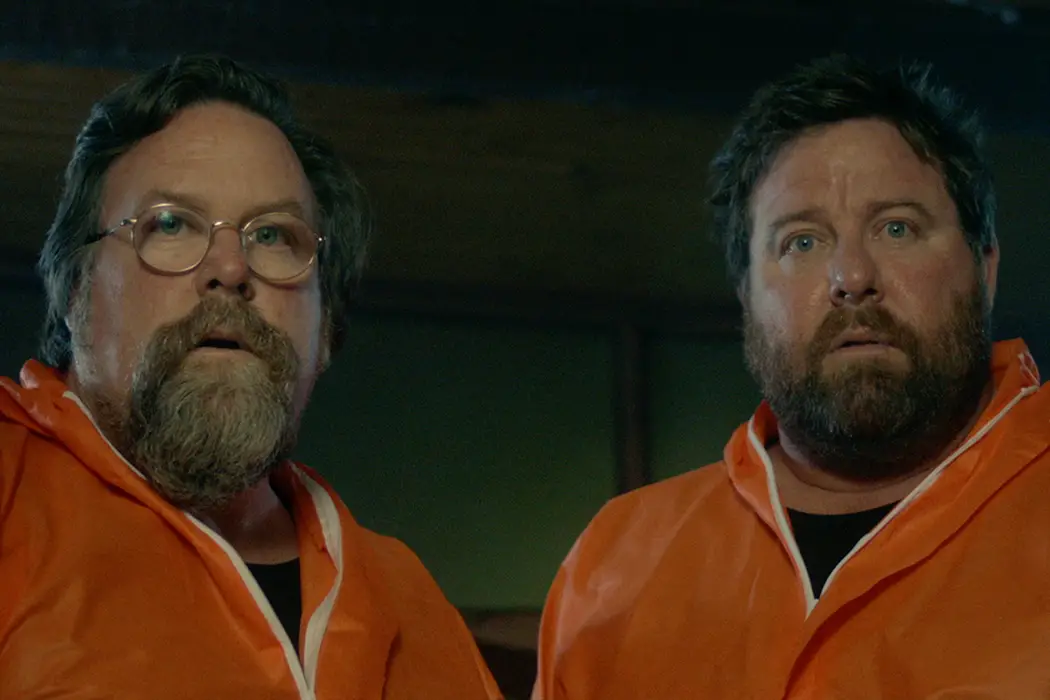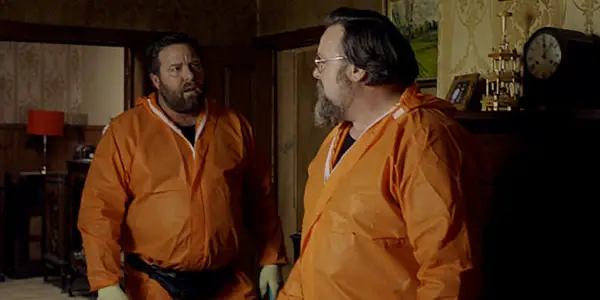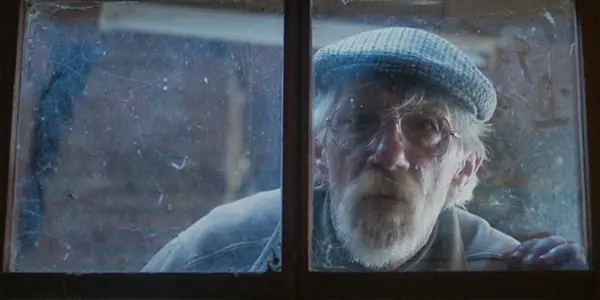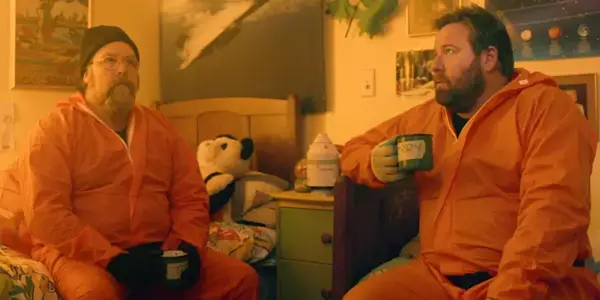BROTHER’S NEST: Like Father, Like Son

Alex is a 28 year-old West Australian who has a…
2018 has been a pretty prolific time for the Jacobson boys, as brothers Clayton and Shane have managed to show up in a few of Australia‘s major cinematic releases – Shane’s appearances include The BBQ, Guardians of the Tomb and That’s Not My Dog, whilst his older sibling Clayton has come off a starring role in the second season of Top of the Lake as well as independent hits Upgrade and Just Between Us.
Now they finally appear on-screen together in Clayton’s sophomore directorial feature Brother’s Nest, a much-anticipated follow-up to his debut that effectively gave them both their current careers, the comedic mockumentary Kenny. Where the 2006 smash-hit saw Shane as the titular plumber who had to deal with the noxious realm of portable toilets, Brother’s Nest places him in a whole new lethal environment, going from having to deal with family’s shits to “Family Shit”.
Home Is Where The Heart Is
You wouldn’t be foolish in thinking that Brother’s Nest was an adaptation of a beloved stage play – its singular setting and minimal characters feel like a stylised reworking of an old theatre script, a physically-restricted narrative thats comparable to recent play-to-screen translations like Fences and Una.
Economical in design, Jamie Browne and Chris Pahlow’s screenplay chooses to contain its action within the childhood home of brothers Jeff (Clayton Jacobson) and Terry (Shane Jacobson). Terry’s early morning bicycle ride into their isolated country house immediately informs us that something dubious is going down, an instinct bolstered by their black hoodies and large camping bags which tells us one thing – this ain’t no ordinary family holiday.

The setup is skilfully established: Terry has enlisted his younger brother’s help in murdering their stepfather Roger, an assassination plan that has been carefully detailed in list-format (with regular intervals for cleaning up of course). Every question that you may think about when planning to kill someone; alibis, DNA, plausible deniability, are all logically resolved by the arrogant Terry, who warns his doubtful accomplice that “failing to plan is planning to fail”.
With their mother dying of cancer, their stepfather’s “convenient” death would circumvent any issues of her will and reward them with the very house that they’re planning to execute him in.
Blood Is Thicker Than Water
This may as well be classified as a ‘haunted house’ movie, as the ghost of Jeff and Terry’s deceased father constantly lingers at the edge of the frame, a haunting presence that hangs over the cautious pair. His name is constantly evoked as a holy figure, given the same sombre reverence as Jesus Christ or the ginger fluff cake of their youth, but unlike that dessert, Terry is having none of it. The power struggle between fathers and stepfathers is one of the film’s major thematic enquires, as the dual influence of both of the fathers is thoroughly explored as the brothers carry out their sinister scheme.

The united impact of these dominant male figures is evident in the brothers’ planned homicide of Roger, which includes staging a break-in by drug addicts that would end in a faked suicide attempt, a bath-time electrocution via an antique radio that Terry considers ‘poetic’ given Roger’s slavish devotion to the outdated technology.
Roger’s meticulous nature of servicing his large radio collection is mirrored in his murderous stepson’s rigorous list-making, an ironic influence that is lost on the desperate men. Donned in matching orange jump-suits that immediately draw comparisons to Breaking Bad, Jeff and Terry go about their day, awaiting Roger’s supposed afternoon arrival, a procedure that like all villainous misdeeds, doesn’t exactly go as originally anticipated.
At its best, Brother’s Nest works as a interrogation into the effects of ancestral influences, analysing those who rebuff the mistakes of their fathers only to make the same errors themselves. This would make a nice pairing with Hereditary, another housebound genre picture which delved into similar territory (but with mothers and daughters instead).
Just as Roger abandoned his own family to marry Terry and Jeff’s mother, Terry and his brother have also bailed on their respective families for differing reasons, but neither acknowledging the source of their inability to commit, a shortcoming that is aggressively confronted when they need to eventually perform their evil plan.
Getting Heavy
The tone of the film is lightened through comic touches that give some much needed breathing room within the increasingly claustrophobic residence, jet black comedy that the pair is quite adept to altering as the proceedings get grim. The character of Terry is Shane Jacobson’s best role in years, a great opportunity to allow the well-established comic actor to really flex his dramatic range in a fashion that never feels overwrought or melodramatic.
Clayton is given the more unlikeable part, but he manages to make the most difficult and potentially maudlin scenes seem honest and true to character. Dramatic two-handers like this live or die by their central performances, and I’m happy to report that the Jacobsons do great work here. To mention the other actors who appear is inherently spoilerific, but as a fan of old-school Australian sketch comedy, it was delightful to see the talented Kim Gyngell in a big film again.

This ice-cold noir does unfortunately include some of the typical modern-day Australian drama tropes – domestic abuse, moments of forced narrative contrivance, muted colour palettes and laboured animal metaphors, all which surface in the film’s predictable third act denouement.
A running subplot about Roger’s sale of Terry’s old horse constantly feels superfluous, and its concluding payoff is ineffective in trying to illustrate how we should feel about Terry’s character – we get it, his comments about the horse are self-reflexive, but its inclusion is obvious when the rest of the script does a good job at keeping its intentions relatively subtle.
Conclusion: Brother’s Nest
Brother’s Nest may be an Australian story, as relatable anecdotes about untouched crystal cabinets and the need for a ‘cuppa’ speak to this, but it’s littered with traditional ideals that are common to all cultures – masculinity, parenthood and the desperation caused by poverty, which explains the film’s successful festival run earlier this year.
Clayton Jacobson showcases a different side to his directing abilities here, deftly handling the confined morality play with an assured hand, aided by Jaime Browne and Chris Pahlow’s efficient screenplay. The late, great Richard Franklin would be proud – Jacobson has crafted a truly impressive Australian Hitchc*ckian thriller, which, in a film about the power of influence, seems quite fitting.
What are some of your favourite Australian films this year?
Brother’s Nest played at several festivals across the world, among them SXSW and Sydney Film Festival. Find where to see the film in Australia here. No international release dates are currently known.
Does content like this matter to you?
Become a Member and support film journalism. Unlock access to all of Film Inquiry`s great articles. Join a community of like-minded readers who are passionate about cinema - get access to our private members Network, give back to independent filmmakers, and more.












